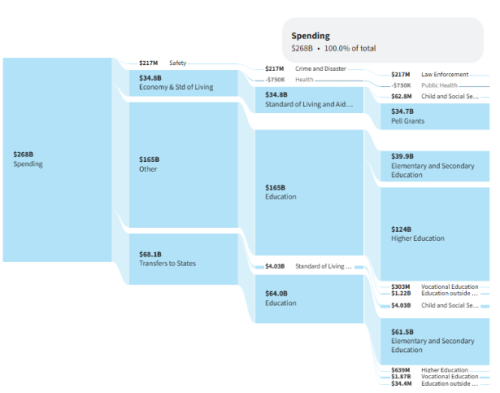How the Closure of the Federal Department of Education Could Impact South Carolina
On March 20, President Trump signed an executive order calling for removal of cabinet status for the U.S. Department of Education (ED). This announcement has made waves in the media, and lots of disinformation has been going around about just what this order means. So how does the Trump executive order on downgrading the U.S. Department of Education affect South Carolina?
Currently, the U.S. Department of Education, established in 1979, oversees all national education policy and manages a budget of $218.4 billion ($267.9 billion in net overlays). This is 3.9% of federal spending. This budget is used to support state education systems and programs that promote educational opportunity such as Title 1 programs and the Pell Grant program of higher education. A good portion of ED funding passes through the agency to fund scholarships. (See the graph below for categorical breakdown of spending for 2024 year)

Source: USA Facts
Why get rid of the Department? Since the department began in 1979, reading and math scores have been decreasing despite per pupil spending being increased by 245%. Additionally, this department currently employs a public relations staff of over 80 individuals, costing on average more than $10 million per year. As the federal agency with the 6th highest spending in 2024, the closing of this federal department will dramatically decrease the burden on taxpayers.
The effects? South Carolina, and all state governments, would potentially play a greater role absorbing the responsibilities of distributing funds across schools, through the potential use of block grants. Fulfilling the needs of preexisting programs such as Title 1, the Individuals with Disabilities Act (IDEA), and McKinney-Vento funding are still slated to be honored and fulfilled. School meal programs are currently funded by the U.S. Department of Agriculture and remain unaffected.
White House Press Secretary Karoline Leavitt reassures that the Department of Education will not be completely disbanded through this executive order. She states, “The Department of Education will be much smaller than it is today…so, when it comes to student loans and Pell Grants, those will still run out of the Department of Education.” The transfer of power and the finer details that come with this executive order are currently being discussed to provide ease for all families.
“Right now, we are in intensive conversations with our local superintendents, and also with the folks in Washington who are coming into the new administration to make sure that they are hearing from the ground up what the impact of these decisions are going to be and to talk about how we can create a glidepath that has the least amount of bumps and friction.”
-Ellen Weaver, SC Superintendent of Education
How concrete is this decision? The U.S. Department of Education (ED) was established by Congress back in 1979, so it will take the approval of Congress to eliminate it. However, there are administrative reductions and costs that can be cut in the Department without Congressional approval.
This change has the potential of returning the role of educating students to the states and allow South Carolina’s education system to flourish.
“I want to affirm that our commitment to protections and funding for students with special needs and those in poverty remains unwavering. Together with our federal and local partners, we’re committed to creating a bright educational future for every South Carolina student to fully realize their God-given potential.”
-Ellen Weaver, SC Superintendent of Education
The Order could benefit South Carolina students, potentially significantly. Our Education Finance Act formula includes weights that compensate school districts for educating lower income children and students with disabilities. It also bases the level of district funding on taxpaying ability. If a new funding stream from Washington were to arrive without mandates, it could be a huge boost for all students and all school districts.
As Superintendent Weaver wrote this weekend in the Post and Courier, “We welcome accountability for student success — if it comes with real flexibility to achieve it. Our charge isn’t to make paperwork perfect but to steward every dollar for the greatest possible impact on students. This is South Carolina’s golden opportunity to lead the way with what we know works.”






